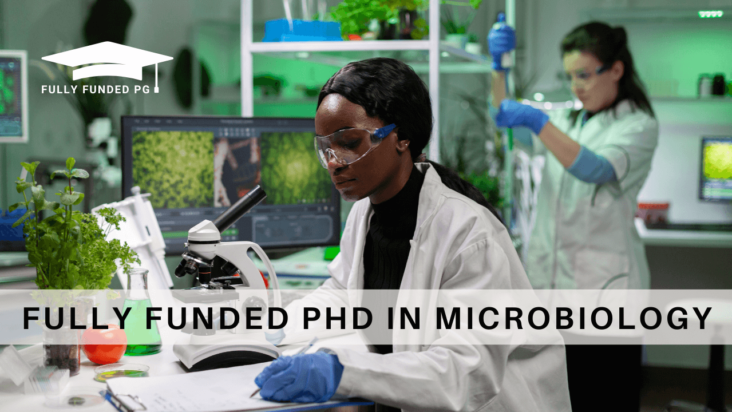Fully Funded PhD in Microbiology in UK
A PhD in microbiology is the highest level of academic achievement an individual can acquire in a university before embarking on post-doctorate pursuits. This level of education comes with a certain level of academic and financial commitment, requiring a lot of monetary and provisional resources. This can be overwhelming for scholars with BSc and MSc in Microbiology, who still want to take it further but can’t due to these financial constraints.
Luckily, there are several universities in the UK that provide all these financial and academic resources for worthy students through fully funded PhD in Microbiology programs. These are universities that, through these programs, create a way for middle- and low-class scholars who have the required knowledge, skills, and commitment to pursue a doctorate degree in microbiology but don’t have the necessary resources to do so.
These institutions offer several important benefits for students, covering their tuition, stipends, and even living expenses, giving students the opportunity to fully focus on their academics and develop advanced expertise in the healthcare sector. In this article, we’ll be highlighting four fully funded microbiology PhD programs in the UK and what they entail.
- University of Cambridge
Established in 1209, The University of Cambridge is one of the world’s oldest and most prestigious academic institutions, serving as a beacon of educational excellence, innovation, and global impact for over 600 years. The school is located in the historic city of Cambridge, England. With several campuses capturing the beautiful scenery of greater Cambridge. It offers a wide array of programs across sciences, arts, and humanities, making it a hub for interdisciplinary collaboration.
Cambridge is home to many iconic schools and research facilities. The city creates a stimulating environment that promotes academic inquiry as it houses world-class libraries. Its longstanding reputation as a research powerhouse attracts scholars and researchers from around the world to come and join in groundbreaking discoveries and inspiring leadership.
The school offers a fully funded program in Microbiology through the Cambridge Bioscience DTP scholarship. This provides students the opportunity to work on impactful research in microbial pathogenesis, antibiotic resistance, and microbial interaction. The program covers all educational costs, including tuition, an annual stipend of about £21,000, and research support. Through this program, students are given the opportunity to advance their expertise and make significant contributions to the field of microbiology.
2. University of Edinburg
The University of Edinburgh was established in 1582, and it is located in the capital city of Edinburgh, Scotland. As one of the top universities in the UK, the University of Edinburgh continues to show academic excellence through academic rigor and a distinguished history. The university offers a vibrant intellectual community, cultivating excellence in teachings and research across various disciplines.
Located in the middle of Edinburgh, the university’s campuses blend historic architecture with modern facilities that provide an inspiring backdrop for student life, adding to the lively cultural scene of the campuses and the reason why it has been designated as a UNESCO World Heritage site. Endinburgh’s dedication to innovative research and scientific advancement has made it a world leader in microbiological research and technology and an ideal place to take up a PhD program in Microbiology.
To show its support for educational advancement, the university offers a fully funded PhD in Microbiology program through its Doctoral College Scholarships, which focuses on environmental microbiology, microbial genomics, and host-pathogen interaction. This funded program covers tuition, living costs, and research grants.
3. University of Warwick
The University of Warwick, established in 1965, is a modern, dynamic institution located in Coventry, England. It is known for its strong focus on research and innovation, which has helped it gain attention as one of the leading universities in the United Kingdom. Through its multidisciplinary approach and dedication to tackling global challenges, the University of Warwick has become a universal hub for scientific research.
The university is set on an evergreen landscape covering over 1500 square meters, with state-of-the-art facilities, advanced laboratories, and huge research centers. Warwick University offers a fully funded PhD program in Microbiology through its School of Life Sciences, which, as a major faculty of the institution, attracts intellects from all over the world, from different cultures, thereby promoting discipline, work-life balance, and exposure through collaborative projects.
One of the School of Life Sciences major-funded programs is the A*STAR Research Attachment Programme, which encourages research in microbial physiology, applied microbiology, and biochemistry. Awarded students benefit from fully funded tuition options, an annual stipend of up to £18,500, and additional funding for research and conference travels. This program encourages students and researchers to contribute to the advancement of fundamental and applied microbiological sciences.
4. Imperial College London
This is a globally renowned research institute founded in 1907. The Imperial College, London, is situated in the bustling city of the South Kensington area in London. It focuses on research applications in sciences, engineering, medicine, and business. The school’s commitment to advanced research and innovation has made it a global leader in addressing complex scientific challenges.
The university’s location in the center of London provides students with unlimited access to world-class research facilities, cultural landmarks, and industry connections. Imperial’s vibrant and diverse academic community fosters collaboration and encourages students to think creatively to solve real-world problems.
Imperial College, through the Department of Infectious Diseases, offers a fully funded PhD program in Microbiology as part of its President’s PhD Scholarship program. This includes research studies and training in antimicrobial resistance, microbial pathogenesis, and environmental Microbiology.
In order for students to focus fully on their academics, the program covers their full tuition, annual stipend, and full support for research projects. This helps prepare the students fully for careers in academia, industry, or public health, as all financial and additional resources needed for completion of the doctorate program have been taken care of.
Disclaimer:
The term “fully funded” is used to address a financial aid package where a student’s educational expenses are being taken care of. This may include;
- Full tuition payment: The total cost of tuition has been waived.
- Stipend/ Salary: A pre-agreed allowance is given to the student to cover living costs and other expenses during the program.
However, It is important to note that this is totally dependent on several factors such as lifestyle, cost of living, location, and other financial needs. Sometimes, the term “fully funded” is used by some programs even though they don’t provide for all your financial needs, expecting that you see them through part-time work, intensional, or personal savings.
These programs usually expect students with fully funded offers to teach and conduct research while studying as part of the funding arrangement. It is also important to note that all universities offer full funding, and students should, therefore, explore financial aid opportunities from various schools (including less popular and well-known ones) in order to find the one that perfectly meets their financial needs.

